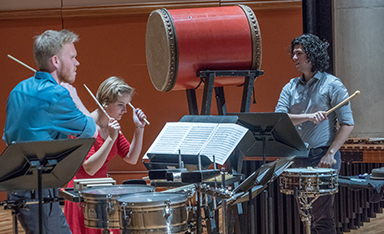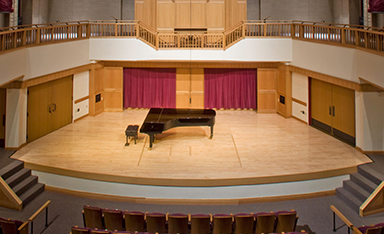Christina Ebersohl Lamont Student Profile
by Ian Wisekal
Christina Ebersohl describes herself as a “nontraditional student”: she is married, has stepchildren, is an Army veteran, is blind, and to top it off, she plays the viola. “The viola isn’t standard,” she said, “and I don’t fit in the box, either. We both just hang out outside the box!”
Ebersohl graduated from Lamont in June 2021 with her master’s in viola performance and is staying on this year to complete a Certificate in Performance. Although she had always been musically active, playing piano, tuba, flute, and other instruments, her path to the viola was also nonstandard: while most string players begin learning their instruments before the age of ten, Ebersohl began her viola study well into adulthood. When she was training to be an Army linguist and began to lose her vision due to complications from a nervous disorder called neuromyelitis optica, she heard a movement from Heinrich Biber’s Rosary Sonatas for solo viola. “The sound was so soulful, so warm,” Ebersohl recalled. “I couldn’t believe that such a sound could come out of that instrument.” A new path was decided.
For Ebersohl, forging new paths is something of a hobby. It was no surprise when the violist won the 2021 Frank Toth Memorial Award, a Lamont prize for extraordinary commitment to extracurricular activities. In addition to her varied musical exploits, the would-be linguist studied Japanese, Russian, French, Italian and Arabic; she is the first-ever blind Licensed Body Mapping Educator; she has developed and presented internationally a course on institutional accessibility; she is the editor of the Journal of the American Viola Society; and she is building a foundation to sponsor a classical music scholarship competition for students who have overcome disabilities.
Body Mapping, Ebersohl explained, is the use of intentional movement to prevent and eliminate performance injuries through efficient and dynamic movement. Ebersohl’s body awareness expanded when she lost her sight, and after she became a licensed instructor, she began offering free body-mapping sessions to struggling Lamont students, advertising in the Lamont Digest.
Being a student with accessibility challenges, Ebersohl was moved to write a paper for her Intro to Graduate Studies class called “Accessibility Is Not a Four-Letter Word” that offers suggestions to institutions to improve their offerings. She published the paper and has presented the course that grew out of it to organizations in the US, Canada and Australia. Ebersohl’s next presentation is to the National Music Library Association, a group of hundreds of librarians across the country.
Finding no existing music scholarship competition geared towards nontraditional or disabled students, and realizing that the vast majority are open only to very young musicians, Ebersohl hopes to fill the gap with her new foundation and competition. Some donations have already been set aside, and with collaborative help from Prof. Matthew Zalkind, she hopes to roll out the first competition in three to four years.
Among Ebersohl’s near-term ambitions are to give two recitals next year, one featuring music by the Italian viola pedagogue Marco Anzoletti, whose works are standard in his native country but virtually unknown in the US. The recital will also act as a fundraising event for the National Federation of the Blind Performing Arts Division. She intends, in addition to her accessibility advocacy work, to continue to push for the viola’s place on the solo stage, in part by recording the composer’s caprices for solo viola. “I don’t like to sit still,” she said in an understatement that elicited a laugh. Ebersohl continued, “In the end, you can have the most natural talent in the world and do nothing with it. It’s the hard work and dedication and commitment that will create success in anyone’s life.”


